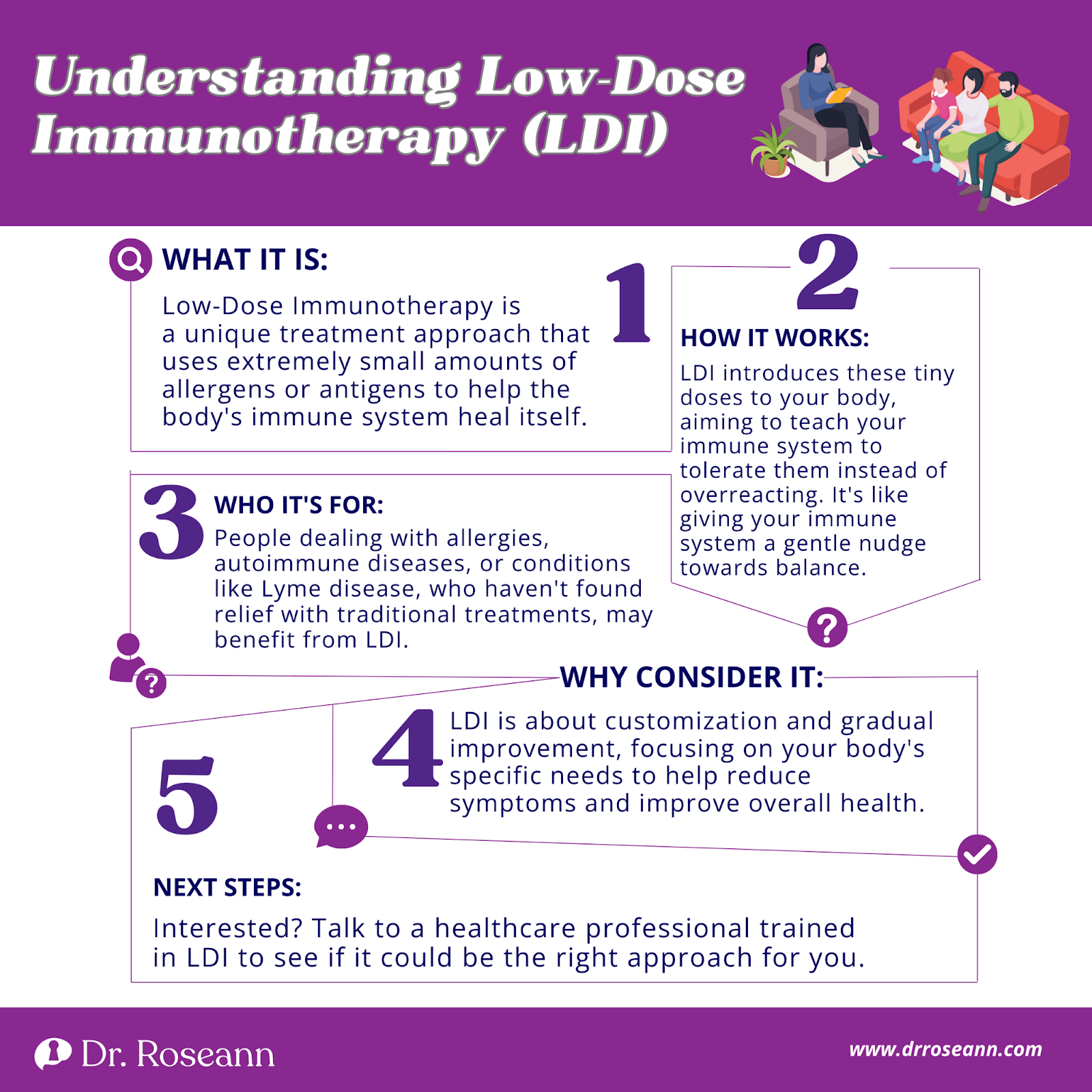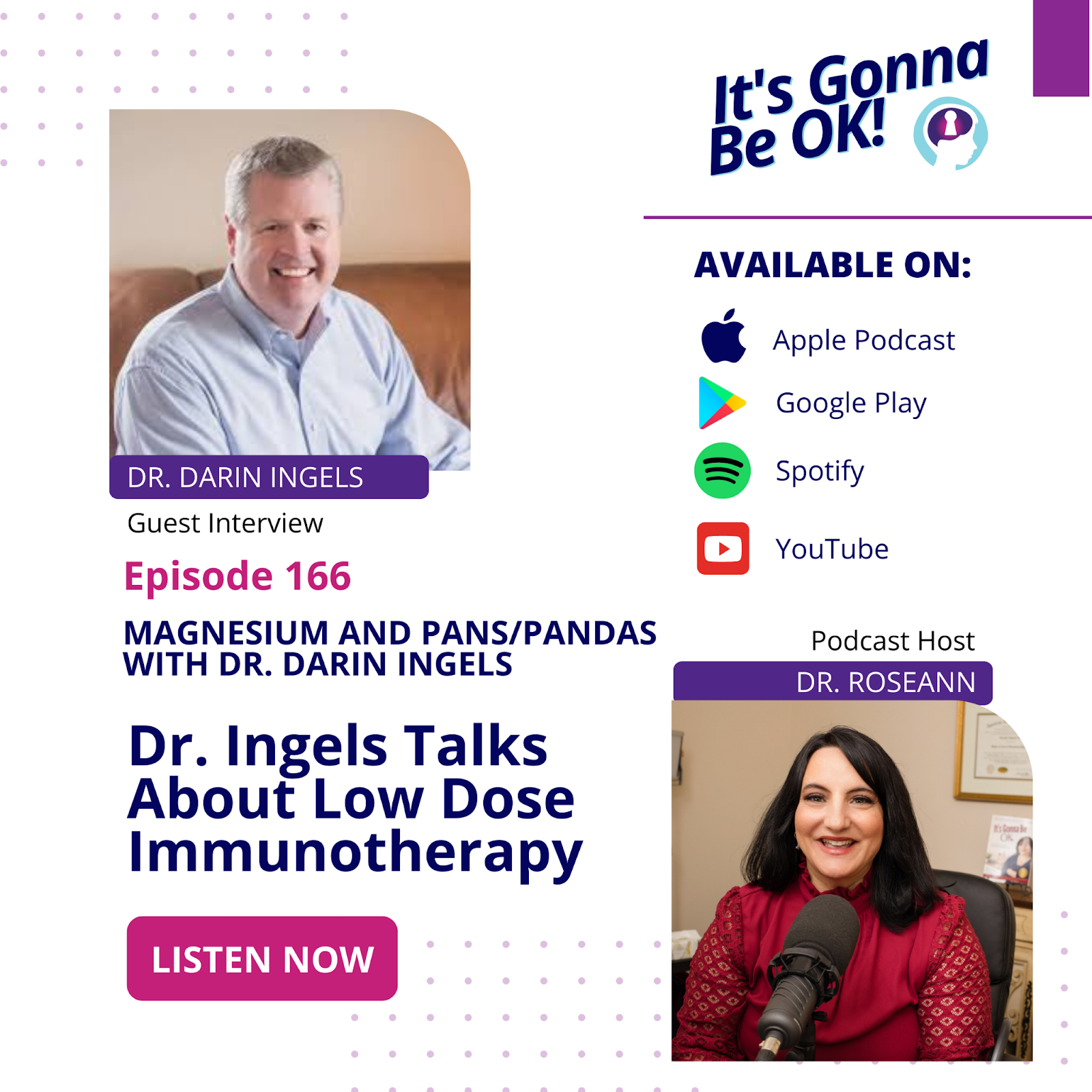Low-dose immunotherapy (LDI) is a promising approach for tackling neuroinflammation, especially in children battling Lyme disease. In my recent podcast, which featured leading experts in integrative medicine, Dr. Darin Ingels highlighted the revolutionary impact of LDI on neuroinflammatory conditions like Lyme disease.
He emphasized the importance of personalized treatment approaches tailored to each patient's unique immune profile. This resonates deeply with my own clinical experience, where I've witnessed the profound benefits of individualized care for children struggling with neuroinflammation.
What is Low-Dose Immunotherapy?
Low-dose immunotherapy involves using tiny doses of allergens, bacteria, or other substances that cause an immune reaction in the body. LDI aims to help desensitize the immune system to these substances and reduce the symptoms associated with conditions such as Lyme disease, autoimmune diseases, and allergies.
The treatment is based on the principle of immunotherapy, which involves exposing the immune system to small amounts of antigens to build tolerance and reduce the severity of immune reactions. However, unlike traditional immunotherapy, which uses high doses of antigens, LDI uses tiny doses customized to the individual patient's immune system.
LDI is administered through a sublingual drop or injection, and the dosages gradually increase over time. The treatment plan is customized based on the patient's unique immune system, and the doses are adjusted as needed to achieve the desired effect.
LDI has shown promise in reducing the symptoms associated with Lyme disease, autoimmune diseases, and allergies. However, it is essential to note that the treatment is still considered experimental, and more research is needed to understand its safety and effectiveness fully. Patients interested in LDI should consult a licensed healthcare professional to determine whether it is a suitable treatment option.

Is Immunotherapy Effective in Neuroinflammation Treatment?
Neuroinflammation, often associated with Lyme disease, can cause issues in a child's cognitive and neurological development. Traditional treatments may offer limited relief, leaving families searching for alternative solutions. This is where Low Dose Immunotherapy steps in.
As Dr. Ingels described it, LDI operates on the principle of immune modulation, aiming to restore balance to the body's inflammatory response. Introducing ultra-low doses of antigens, LDI seeks to recalibrate the immune system. It also fosters tolerance and dampens harmful inflammation. This nuanced approach holds immense promise for children grappling with the complexities of neuroinflammatory disorders.
What You Need to Know About Low-Dose Immunotherapy
Parents often have numerous questions about LDI, and rightly so. Understanding the science behind it can be daunting, but the concept is more straightforward than it seems. Think of LDI as a personalized immunotherapy tailored to your child's needs.
Dr. Ingles also addressed the common misconceptions surrounding LDI. He emphasized its safety and efficacy when administered by trained professionals. This echoes my sentiments as a clinician, where I've witnessed firsthand the transformative impact of LDI on children's lives.
Dispelling myths and demystifying the treatment process empowers parents to make informed decisions about their child's healthcare journey. The common misconceptions about Low Dose Immunotherapy (LDI) for Lyme disease include:
- It's a Cure-All: While LDI shows promise in managing symptoms associated with Lyme disease, it's not a guaranteed cure. It's part of a comprehensive treatment plan that may include antibiotics, lifestyle modifications, and supportive therapies.
- It's the Same as Traditional Immunotherapy: LDI differs from traditional immunotherapy, utilizing ultra-low doses of antigens to modulate the immune response. Some may confuse it with standard immunotherapy protocols, leading to misunderstandings about its mechanisms and efficacy.
- It Works Instantly: LDI often requires multiple treatments to see noticeable improvements over time. Patients may need patience and consistent monitoring to gauge their effectiveness fully.
- It's Risk-Free: While LDI is generally considered safe when administered by qualified practitioners, there's still a potential for side effects or adverse reactions. Patients should be monitored closely and report any unusual symptoms to their healthcare providers.
- It's a Standalone Treatment: LDI is most effective when integrated into a holistic treatment approach that addresses all aspects of Lyme disease, including infection control, symptom management, and immune support. It's not meant to replace other therapeutic modalities but rather complement them.
The Surprising Benefits of Low-Dose Immunotherapy for Brain Health
Addressing the underlying immune dysfunction is paramount when it comes to neuroinflammation. LDI offers a multifaceted approach, targeting the symptoms and root causes of neurological disorders like Lyme disease.
As Dr. Ingels stated, LDI is promising to enhance cognitive function and overall brain health. It helps alleviate neuroinflammation, allowing children to experience improved clarity, focus, and mental resilience to help pave the way for a brighter future. This aligns with my clinical observations, where children thrive responding to LDI treatment. They could reclaim their joy and vitality in the face of adversity.
A study (Forsgren, 2015) discusses Low-Dose Immunotherapy for Chronic Fatigue Syndrome (CFS) and Lyme disease. It covers the theory of the potential mechanisms of action and its application in treating these conditions.
The study emphasizes ongoing immune activation, immune deviation, and autoimmune processes as critical factors. Symptoms are believed to stem directly from chronic inflammation and related autoimmunity, making them good potential candidates for low-dose immunotherapy (LDI) treatment (Forsgren, 2015).
LDI for Neuroinflammation and Beyond
While LDI's efficacy in treating neuroinflammation is promising, its potential extends beyond Lyme disease. LDI may be therapeutic for various autoimmune conditions, allergies, and certain cancers (Klatzmann & Abbas, 2015).
Low-dose immunotherapy represents a paradigm shift in the treatment of neuroinflammation, offering newfound hope for children battling Lyme disease and related conditions. As we navigate this journey together, let's embrace the transformative potential of LDI and usher in a new era of healing and resilience.
If you want more help with Lyme disease and PANS/PANDAS, download the Natural PANS/PANDAS Calm Brain Kit and empower your child. Help them achieve a calm brain without relying on medication.
What are some potential benefits of LDI for children with neuroinflammatory disorders?
LDI may offer benefits such as improved cognitive function, enhanced brain health, and reduced symptoms associated with neuroinflammation, ultimately empowering children to thrive despite their conditions.
Is LDI effective for conditions other than neuroinflammation, such as cancer or autoimmune diseases?
While LDI primarily focuses on neuroinflammation, emerging research suggests potential applications for conditions like autoimmune diseases and certain cancers, highlighting its versatility in immune modulation.
Are there any risks or side effects associated with LDI treatment?
LDI is generally considered safe when administered by qualified healthcare professionals. However, as with any medical intervention, potential side effects or adverse reactions should be carefully monitored and addressed.
Is immunotherapy effective?
Yes, immunotherapy has proven to be effective in treating various types of cancer and autoimmune diseases. It harnesses the body's immune system to recognize and attack cancer cells or targets specific immune pathways involved in autoimmune conditions.
What is the success rate of immunotherapy?
The success rate of immunotherapy can vary depending on factors such as the type and stage of cancer, the specific immunotherapy used, and individual patient characteristics. Overall, immunotherapy has shown remarkable success in treating certain types of cancer, with some patients experiencing long-term remission or even cure.
How successful is immunotherapy on kids?
Immunotherapy has shown promising results in treating certain types of cancer in children. Some children may experience significant benefits from immunotherapy, including tumor shrinkage and prolonged survival, while others may not respond as favorably.
How effective is immunotherapy for cancer?
The effectiveness of immunotherapy for cancer varies depending on several factors, including the type of cancer, stage of the disease, and individual patient factors such as overall health and immune function. Immunotherapy has shown remarkable success in certain types of cancer, such as melanoma, lung cancer, and kidney cancer, leading to long-term remission or even cure in some patients.
How much does Opdivo cost?
Opdivo is an anti-cancer medication used to treat several types of cancer. Opdivo cost per month can vary depending on factors such as the dosage, treatment duration, and location. In the United States, Opdivo is an expensive medication, with costs typically ranging from tens of thousands to over a hundred thousand dollars per year of treatment.
Dr. Roseann is a mental health expert in Lyme Disease who frequently is in the media:
- The Mack Talks Podcast Topic: Fighting the Stigma on Mental Health & Lyme Disease with Dr. Roseann
- Project Lyme: Neurofeedback
- Biofeedback Certification International Alliance (BCIA) Webinar Neurofeedback & Lyme
Always remember… “Calm Brain, Happy Family™”
Disclaimer: This article is not intended to give health advice and it is recommended to consult with a physician before beginning any new wellness regime. *The effectiveness of diagnosis and treatment vary by patient and condition. Dr. Roseann Capanna-Hodge, LLC does not guarantee certain results.
Are you looking for SOLUTIONS for your struggling child or teen?
Dr. Roseann and her team are all about science-backed solutions, so you are in the right place!
Empower your child with Lyme Disease. Download the
Natural PANS/PANDAS Calm Brain Kit
Dr. Roseann is a Children’s Mental Health Expert and Licensed Therapist who has been featured in/on hundreds of media outlets including The Mel Robbins Show, CBS, NBC, PIX11 NYC, Today, FORBES, CNN, The New York Times, The Washington Post, Business Insider, Women’s Day, Healthline, CNET, Parade Magazine and PARENTS. FORBES called her, “A thought leader in children’s mental health.”

She coined the terms, “Re-entry panic syndrome” and “eco-anxiety” and is a frequent contributor to media on mental health.
Dr. Roseann Capanna-Hodge has three decades of experience in working with children, teens and their families with attention-deficit hyperactivity disorder (ADHD), autism, concussion, dyslexia and learning disability, anxiety, Obsessive Compulsive Disorder (OCD), depression and mood disorder, Lyme Disease, and PANS/PANDAS using science-backed natural mental health solutions such as supplements, magnesium, nutrition, QEEG Brain maps, neurofeedback, PEMF, psychotherapy and other non-medication approaches.
She is the author of three bestselling books, It’s Gonna Be OK!: Proven Ways to Improve Your Child's Mental Health, The Teletherapy Toolkit, and Brain Under Attack. Dr. Roseann is known for offering a message of hope through science-endorsed methods that promote a calm brain.
Her trademarked BrainBehaviorResetⓇ Program and It’s Gonna be OK!Ⓡ Podcast has been a cornerstone for thousands of parents facing mental health, behavioral or neurodevelopmental challenges.
She is the founder and director of The Global Institute of Children’s Mental Health, Neurotastic™Brain Formulas and Dr. Roseann Capanna-Hodge, LLC. Dr. Roseann is a Board Certified Neurofeedback (BCN) Practitioner, a Board Member of the Northeast Region Biofeedback Society (NRBS), Certified Integrative Mental Health Professional (CIMHP) and an Amen Clinic Certified Brain Health Coach. She is also a member of The International Lyme Disease and Associated Disease Society (ILADS), The American Psychological Association (APA), Anxiety and Depression Association of America (ADAA) National Association of School Psychologists (NASP), International OCD Foundation (IOCDF).
© Roseann-Capanna-Hodge, LLC 2024











